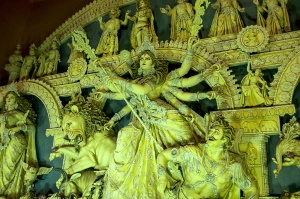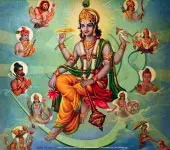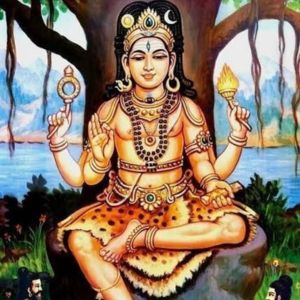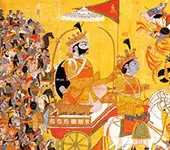This discourse tells you about- 1. How Mahabharata purifies your mind. 2. How the central theme of Mahabharata is Lord Krishna. 3. How the bhava with which you are doing anything is important.
Comments
Transcript
(Click here to read more)
We are discussing Anukramanika Parva of Mahabharata, the very first Parva. In this, we saw about Ugrashrava Sauti the primary narrator of Mahabharata, about creation in brief, how the entire Mahabharata appeared in the mano mandala of Sage Vyasa as he was meditating, how he wanted to propagate this knowledge, how Lord Ganesha helped him by penning down as Vyasa went on dictating, importance of Mahabharata as a primary text of dharma, different versions of Mahabharata meant for....
Transcript
(Click here)
We are discussing Anukramanika Parva of Mahabharata, the very first Parva.
In this, we saw about Ugrashrava Sauti the primary narrator of Mahabharata,
about creation in brief,
how the entire Mahabharata appeared in the mano mandala of Sage Vyasa as he was meditating,
how he wanted to propagate this knowledge,
how Lord Ganesha helped him by penning down as Vyasa went on dictating,
importance of Mahabharata as a primary text of dharma,
different versions of Mahabharata meant for different Lokas such as Devaloka, Pitruloka, Manushyaloka,
a very brief description of how the war started,
how Duryodhana's jealousy and short temper was behind it.
Then, Dhritarashtra started lamenting about the death of his sons to Sanjaya and also told mentioning incident after incident how he was sure about the defeat of the Kaurava paksha.
Sanjaya consoled him saying that everyone has to die, someday or the other, no matter how strong or good they are.
And he should not grieve for his sons who invited death for themselves.
Mahabharata is qualified to be called an Upanishad because it removes ajnana.
We also saw that listening to Mahabharata or reading can purify you.
What is this internal purity we are talking about?
Internal purity means:
Absence of kama- lust, desires.
Absence of krodha- anger.
Absence of lobha- greed.
Absence of moha- absence of wrong knowledge.
Absence of mada- arrogance.
Absence of matsarya- competition.
If you remove these six from your mind, then your mind will feel light.
There are many more vices but these are the main vices.
But primarily, if you are able to remove these six from your mind then you will feel light.
This is called purity of mind.
This Mahabharata can give you.
Just by listening to Mahabharata or reading Mahabharata, you can achieve this internal purity.
When mind becomes pure, then your papas are also washed away.
If you have these in your mind, these vices in your mind, then the sins already committed will not go away.
Removal of these vices is essential for removal for papa, release from papa.
Mahabharata has got tremendous power to remove these vices from the mind and to make mind pure thus achieving also removal of papas, past sins, effect of past sins, results of past sins.
You need not know the entire Mahabharata.
Even listening to one shloka or half of it every day is sufficient.
That much power is there in every shloka of Mahabharata.
Mahabharata itself says that even one-quarter of a stanza has the power to cleanse the mind.
There is a lot in Mahabharata: about Devas, about Brahmarshis, Devarshis, Yakshas, Nagas.
But the central theme of Mahabharata is Lord Krishna, Vasudeva.
Because he is Paramatma, Parabrhama.
He is truth, both internal and external.
He himself is the purity and punya to be achieved.
Wise men, they always talk about him only, his leelas, what all he did.
The universe comprising of, the experience of the universe called asat or unreal and also what is real, and those in-between; meaning those which keep on shifting between asat and sat, all these have originated from Lord Krishna only.
Everything creation, procreation, all actions, all reasons for actions, birth death of umpteen number of beings, trillions and trillions of beings, they all happen within Lord Krishna only.
Mahabharata talks about everything: about Jeevatma or embodied being, about pancha bhutas, what caused the pancha bhutas, the three gunas, what caused the three gunas, the ayakta-prakriti, and also what is beyond all these, Paramatma.
Yogis experience this Parabrahma, Paramatma in their hearts.
From Jeevatma to Paramatma everything is described in Mahabharata.
There is something important about this Anukramanika Parva.
If you listen to this every day or read this every day, all your papas will go away.
Nothing can affect you if you do this.
Even if there are calamities, they will not affect you.
This part Anukramanika is considered as the moola sharira of Mahabharata.
While performing shraddha, while brahmins are fed in the place of ancestors, this Anukramanika of Mahabharata should be read out, they should listen to this.
This is called Abhishravanam.
Not just Anukramanika, there are many abhishravana mantras.
Along with them, reading Anukramanika Parva during shraadha has great benefits.
It is said that, if someone knows only Vedas, not Itihasa and Purana, then Veda itself will be afraid of him because he is likely to misinterpret Vedas.
Vedas should be understood through Itihasa and Puranas, not just bhashyas.
So, if you don’t know the Itihasas and Puranas, then your knowledge is incomplete.
Once, long ago, Devas put all the four Vedas along with their rahasyas, ancillary texts on one side of a balance and Mahabharata on the other side.
Mahabharata stood heavier.
It is because of being heavier than Vedas that it is called Bharata- bharatvat bharatam; and because of its greatness Mahabharatam, mahatvat.
A lot of importance is given in Mahabharata about your bhava when you are doing something.
Tapasya when done for a good purpose is good.
Same Tapasya if it is for acquiring power and harming others, like how Asuras do, it is not good.
So tapasya per se is neutral.
Why are you doing it, that makes all the difference.
Whether it is good or bad, it depends on that.
Same is the case with learning shastra, following shastra.
Learning Veda, performing karma mentioned in the Vedas.
If it is for everyone’s welfare, then it is good.
If it is to harm others, then it is bad.
Bhava is the most important thing.
This is a principle that Mahabharata brings out.
Recommended for you
Devi Jagadamba does not mind even if you make mistakes while worshiping her
 Click here to know more..
Click here to know more..
Lakshmi Devi has the authority over the eternal world and she controls the entry into it
 Click here to know more..
Click here to know more..
Dakshinamurthy Stava

उपासकानां यदुपासनीय- मुपात्तवासं वटशाखिमूले। तद्धाम दा....
Click here to know more..
English Topics
Mahabharatam
Click on any topic to open
- 96 Two Curses That Worked against Karna
- 95 What is behind Calling the Five Brothers the Pandavas
- 94 Give up an Individual IF....
- 93 Fascinating Birth Story of the Kauravas
- 92 Overcoming Grief - Lessons from King Senajit's story
- 91 Yayati's Wisdom
- 90 Yayati's Story
- 89 Brahmacharis Can Bless And Curse
- 88 Human Nature - Comples Mix Of Good And Bad
- 87 Results Of Good Karma
Please wait while the audio list loads..
30
Ganapathy
Shiva
Hanuman
Devi
Vishnu Sahasranama
Mahabharatam
Practical Wisdom
Yoga Vasishta
Vedas
Rituals
Rare Topics
Devi Mahatmyam
Glory of Venkatesha
Shani Mahatmya
Story of Sri Yantra
Rudram Explained
Atharva Sheersha
Sri Suktam
Kathopanishad
Ramayana
Mystique
Mantra Shastra
Bharat Matha
Bhagavatam
Astrology
Temples
Spiritual books
Purana Stories
Festivals
Sages and Saints
